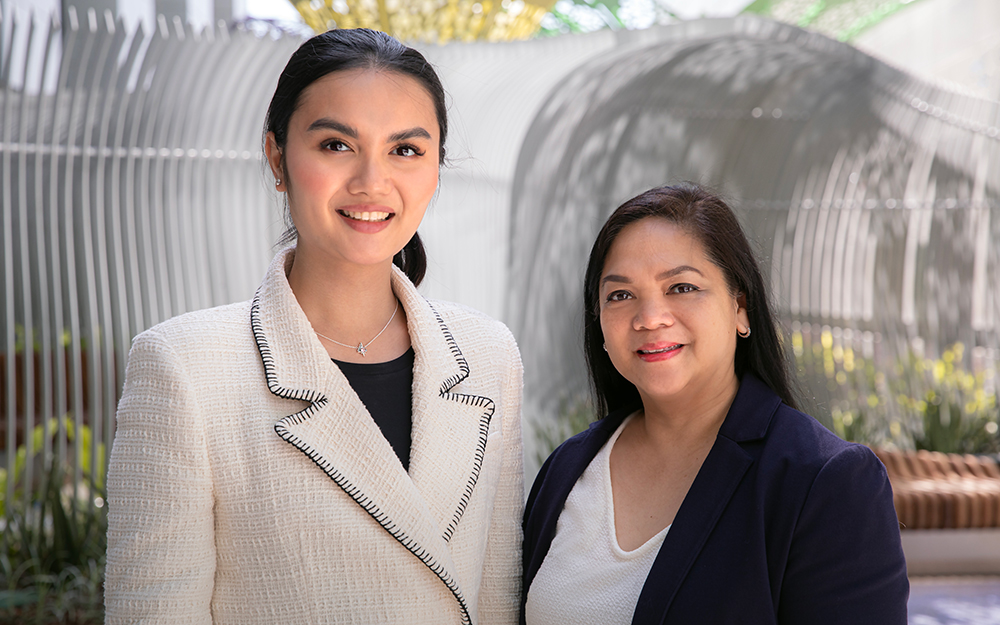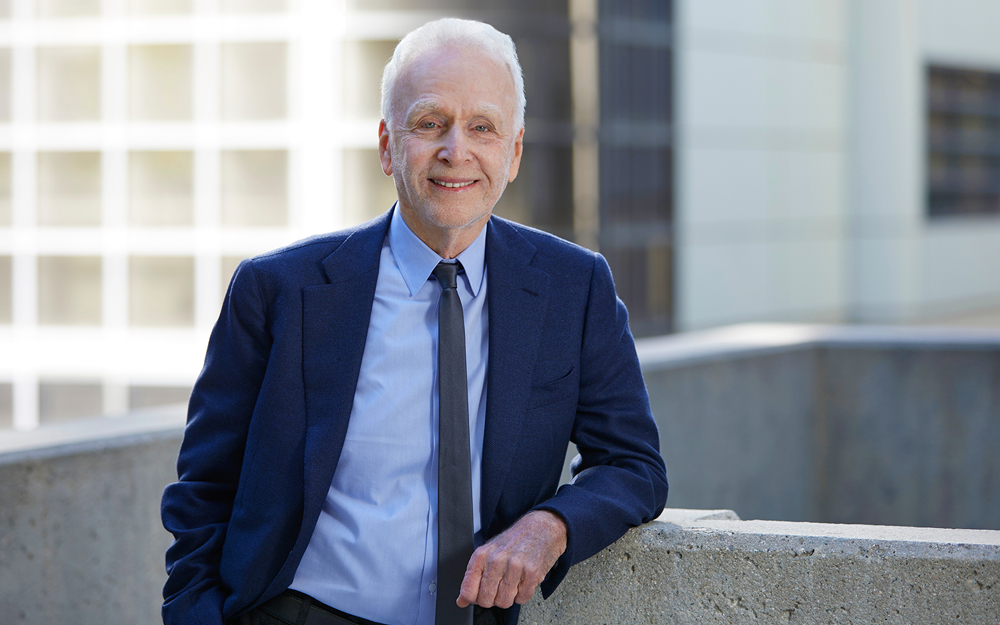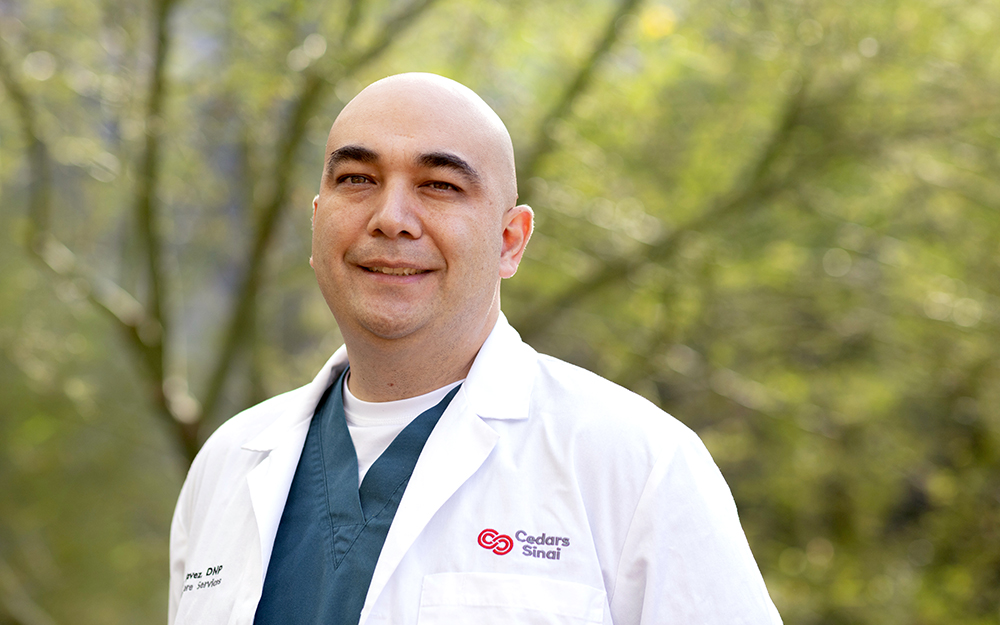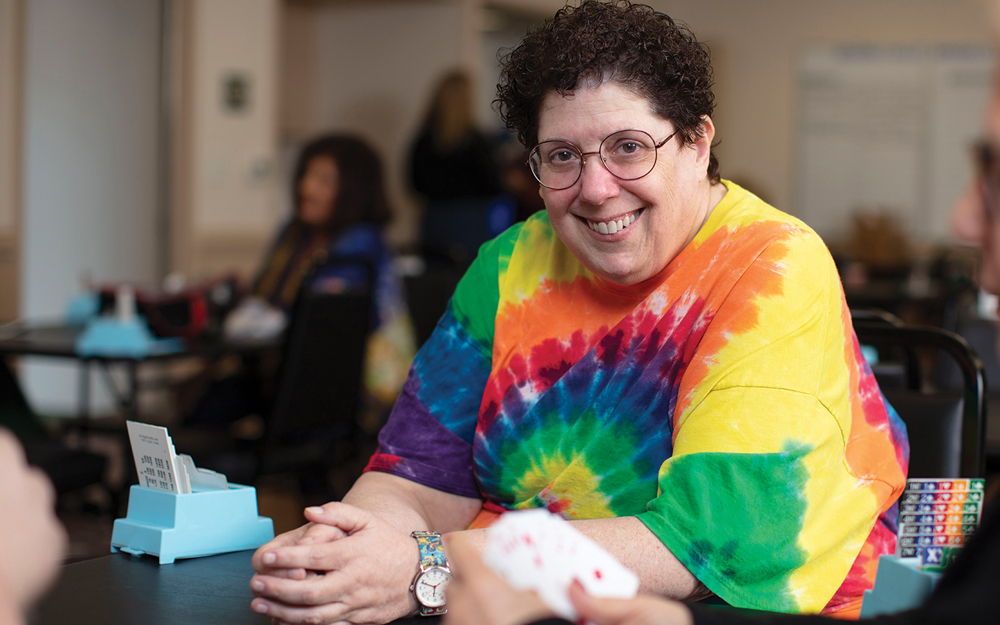An AI Ally for Mental Health
Date
April 16, 2024

Date
April 16, 2024
Credits
Medical providers featured in this article
In Brief
{{cta-block}}
Imagine sharing a painful problem or frustration in total confidence and receiving warm, nonjudgmental support and insightful suggestions. As you confide, your surroundings transform—perhaps with a swirl of butterflies and a swell of gentle music—until you’re in an ethereal forest being guided through a meditation tailored to your mood.
Next, you realize you’ve never left your own home or hospital room. That’s only the beginning of an experience with Xaia, a mental health platform developed at Cedars-Sinai that delivers immersive and personalized care through a combination of advanced technologies.
The technology brings together sophisticated artificial intelligence (AI) and extended reality with the powerful spatial computing capabilities offered with Apple Vision Pro. Xaia was developed, trained and tested by Cedars-Sinai researchers from multiple disciplines, including psychology and behavioral health, psychiatry, AI, and health technology.
“If you’re talking about feeling a bit anxious or stressed, Xaia talks with you in a natural, conversational tone and then uses what we call ‘generated reality’ to create a world designed to calm your emotions,” said Brennan Spiegel, MD, MSHS, professor of Medicine, director of Health Services Research at Cedars-Sinai, and co-founder of the Xaia technology. “And it all happens with this robot named Xaia.”
The question isn’t whether this is a replacement for therapy. The question is, do patients find it helpful for alleviating their distress. If the answer is yes, then we have a very valuable tool."
— Dr. Itai Danovitch
Xaia—eXtended-reality Artificially Intelligent Ally—is the avatar at the heart of the experience, appearing as a 5-foot-tall robot with wide brown eyes and a soothing voice. Xaia guides users through immersive therapy sessions using scores of evidence-based techniques after a year of development. Spiegel’s team has tested Xaia extensively and launched an app for Apple Vision Pro in February. The platform is planned for use with Cedars-Sinai inpatients, supplementing the care of mental health professionals, and is available to the general public.
“Xaia isn’t here to replace human therapists,” said Spiegel, who holds the Dorothy and George Gourrich Chair in Digital Health Ethics. “We know there is a huge disconnect between the number of people who have mental health needs and the number of available trained therapists. Across the country, hospitals don’t have enough psychologists on staff, and Xaia can help.”
Itai Danovitch, MD, chair of the Department of Psychiatry and Behavioral Neurosciences at Cedars-Sinai, tested the technology but wasn’t directly involved in its development.
“When people are distressed, they often find it helpful to express and talk through their challenges,” he said. “This may be a valuable medium to enable verbal processing and self-reflection.”
Creating Xaia
Spiegel and his colleagues—including psychiatrist Omer Liran, MD, who programmed the software from scratch, and clinical psychologist Robert Chernoff, PhD—started the Xaia project in April 2023 to explore whether AI could provide good therapy. In the early weeks, the answer was no. They pulled in more input from therapists along with transcripts of patient conversations with therapists to train the AI language model in evidence-based techniques—and warm up its manner.
“About three months in, we had a breakthrough and found it was supporting people empathetically,” Spiegel said.
The researchers moved from digital patients to therapists sitting in as “simulated patients” to test more serious scenarios. In a domestic violence scenario, the Xaia avatar acted increasingly concerned.
“It finally said, ‘I’m a robot, and I can’t call the police, but you need help,’” Spiegel said. The avatar followed up with research and insightful instruction that surprised even the therapists in the training. For example, Xaia advised using “incognito” mode when searching the internet for help in case the abusive partner was monitoring their online activity.
The team published a study in Nature Digital Medicine in which 14 participants with mild to moderate anxiety and depression interacted with Xaia for 30 minutes each, followed by debriefing interviews. Topics included loneliness, family problems and financial distress.
In one exchange, a participant said they relied on other people to assure them of their self-worth and worried about rejection. Xaia’s response: “That’s quite an insightful observation about yourself. It can be challenging when our self-worth is tied to the approval or validation of others. Fear of rejection can indeed make social interactions daunting. Could you share a little more about where you think this need for validation comes from?”
Beyond a Beautiful Platform
In addition to inspiring trust in patients, Xaia serves as a practical triage system. Rather than fill out lengthy mental health assessments, people can instead have a conversation with Xaia.
“You can sit in your hospital room, and this robot will stand by you and engage in a surprisingly empathetic and personal conversation about what’s going on in your life,” Spiegel said. “She is simultaneously looking for any alarms, summarizing key points and collecting the data clinicians need to understand patient needs.”
Xaia can, as appropriate, offer strategies and interventions for issues and then document the conversation as a note in a patient’s medical record. That note can be made viewable by the patient’s care team to provide important data to help therapists better understand their patients.
The platform is being tested to determine if it can help people with alcohol use disorder who need organ transplants, patients working on changing their diet after bariatric surgery, patients with inflammatory bowel disease and older adults struggling with loneliness.
“There is a human need for connectedness and we know that social isolation has the same health risks as smoking 15 cigarettes a day,” said Allison Mays, MD, a geriatrician at Cedars-Sinai. “Older adults who are lonely and socially isolated are less likely to remember their medications, eat well and see their doctor. We need more interventions to address these serious risk factors in older adults.”
Why a Robot?
In an immersive world where a therapist avatar could look like anyone or anything, developers specifically chose a robot.
“It’s important to understand fundamentally that Xaia is not human,” Spiegel said. “Xaia is here to complement human therapists.”
Not being human has an important benefit: Xaia is nonjudgmental. The team has tested and studied Xaia to safeguard the platform against implicit biases and discrimination based on race, gender or sexuality.
The system includes multiple measures to help ensure that, as the AI continues to learn, it will maintain evidence-based values at its core. It’s also designed to be secure and compliant with patient privacy laws.
Ultimately, the vision for Xaia is that it will be a “care-extender,” Spiegel said.
Danovitch underscored that psychotherapy is a human interaction, and the empathy, clinical judgments and insights that a trained human clinician can provide remain unique.
“The question isn’t whether this is a replacement for therapy,” Danovitch said. “The question is, do patients find it helpful for alleviating their distress. If the answer is yes, then we have a very valuable tool.”





